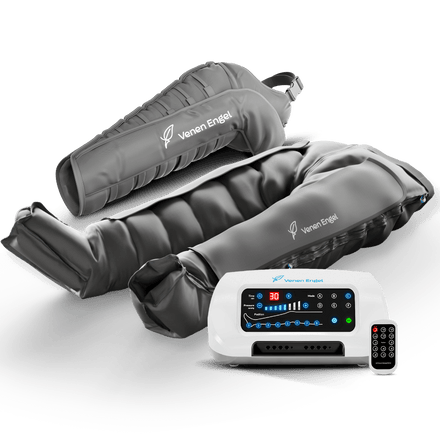
Emotionally challenged in everyday life
Painful conditions, such as lipedema or lymphedema, are not mental illnesses themselves, but their impact on quality of life can have enormous consequences for the mental health of those affected, as psychological complaints can indeed develop from them.
Connection between Stress and Pain
The fact that there is a connection between increased pain perception and stress is now well documented. Even if stress is not the primary cause of the development of lipedema or lymphedema, stress is considered a sustaining factor for the pain.
A vicious cycle of pain and discomfort is the result: The perception of pain is intensified by stress. Pain turns into discomfort. Discomfort turns into more stress. More stress leads to more pain. And more pain leads to withdrawal, shame & self-criticism, resulting in more stress and more suffering.
The internal suffering is also high
But not only external factors affect the psychological stability of those affected by lipedema or lymphedema. Long-held beliefs, so-called intra-psychological factors, are not visible to the outside world, but they cause enormous stress for those affected. Through the constant repetition and influence of these beliefs, the internal system is burdened on a physiological level in the long term. Beliefs can, for example, be:
"I must be thin to be loved." or "I have to achieve a lot to be accepted."Those affected by lipedema and lymphedema face the great challenge of accepting themselves and their bodies despite all the discomfort. What is already difficult for healthy people often reveals itself as an almost insurmountable hurdle for those affected, given the pain and limitations. Since a large proportion of those affected also suffer from an increase in fat cells, which leads to visible physical changes, they are also exposed to social judgments in the form of devaluations.

Psychology as Support for Those Affected
Lifestyle changes play a major role in the treatment of visible symptoms of edema. From a medical perspective, these include primarily the consistent change in eating behavior, exercise intensity, but also a reduction of stress in everyday life as well as wearing compression stockings.
On a psychological level, behavioral medicine provides helpful support. It aims to empower affected individuals to implement and maintain behavioral and therapy recommendations in the long term. The goal is to improve symptoms and reduce the potential for deterioration over time. Psychological or psychotherapeutic support can also help identify and improve individual stress factors. At the same time, stress reduction and appropriate relaxation techniques are learned. Both are good tools to promote resources and increase stress tolerance.
Specifically: This is how I help my patients
Now let's change the perspective for an intense look inward: I want to take you on an excursion into my own experiences from practice and with my patients. One of the most common questions I have encountered in my therapeutic work is …
"How can I learn to love and accept myself?"The question of self-acceptance, that is, the awareness of bringing acceptance to oneself, is a form of our self-perception. Since this is very closely linked to our self-esteem, a mutually dependent process arises: Working on the feeling you bring to yourself corresponds to working on your self-esteem. If this changes, it automatically influences your entire self-perception. This self-perception, in turn, significantly influences how much acceptance you bring to yourself.
Sounds pretty simple, doesn't it?
Almost, because self-esteem is not about a big task that is completed once and then self-esteem is built. It's about the everyday little things and experiences in life where you attribute value to your own self. And also about changes in your own perception.


I want to encourage you to find your own path to self-worth. Take time each day to listen to yourself. Ask yourself questions about your well-being and get a sense of where you currently stand with your self-care. I'm happy to help you with a few introductory questions.
Questions about self-care: How are you?
Focusing on self-care is a challenge, especially amidst the hustle and bustle of everyday life. With a few questions about habits and routines, we want to determine initial indicators of self-worth:
Question about physical self-care
- How much do you move daily?
- How much water do you drink daily?
- How do you take care of your skin?
- How do you ensure a pleasant sleep routine?
- Are you getting enough sleep?
- Do you use sleep-promoting rituals?


Questions about psychological self-care
- What do you do to feel comfortable with yourself in a way that suits you today
- Are you worth taking the time for the things that bring you joy?
- Have you ever taken the time to find out what is good for you?
- Do you like to read?
- Do you like art exhibitions or would you like to attend a painting course yourself?
- Or do you feel more like music and a bath followed by "beauty time"?
Full commitment to your needs
Knowing oneself and one's own needs is a crucial factor when it comes to building self-esteem and self-care. Only those who know themselves can advocate for themselves. The prerequisite, of course, is to perceive, understand, and get to know one's own physiological and psychological needs and the associated emotions.
Helpful Image: A Medal with Two Sides
I would like to share an image from my psychotherapeutic work with you: Imagine you are wearing a chain, like a medal. On one side it says YES and on the other side NO.
Which side points to whom?
When you say YES to others, the NO side shows to you. So you are saying NO to yourself. Now go within and ask yourself:
How does it feel to say NO to yourself?
And how does it feel to do this over and over again?
If the YES side is facing you, then the NO side is facing outward.
How does it feel to say YES to yourself?
YES, to your needs? YES, to your value?
YES to YOUR own SELF-WORTH?

Encounter yourself with help
It is understandable that you carry anger, sadness, or shame within you due to your experiences. Because even though lipedema or lymphedema are not mental illnesses, they can lead to self-esteem issues. The likelihood is particularly high if a negative self-image already exists before the illness. Mental illnesses, such as depression, anxiety disorders, addiction disorders, and sleep disorders can be the result.
Psychotherapeutic support can help you understand and accept your feelings, identify and work on the underlying issues. Because acceptance does not mean helplessly submitting to the illness. That would only result in more dissatisfaction and self-esteem problems. Dealing with the illness is about finding the balance between what you can change and what you cannot change and therefore must accept.
In the way you treat yourself and allow yourself to be supported, as is possible and good for you, lies your path to self-worth and self-care.

About the Expert:
Nina Lejeune is a psychotherapist from Düsseldorf and passionately committed to the psychophysiological education and support of her clients. As an experienced psychologist and psychological psychotherapist, she specializes in the treatment of trauma-related disorders and stress diseases. However, her work goes far beyond classical therapy: As a certified yoga teacher and through numerous further trainings, she imparts deep knowledge about the nervous system and its influence on the entire body. Her expertise ranges from alleviating pain and gastrointestinal problems to dizziness, feelings of overwhelm, and various bodily discomforts. With great dedication and commitment, Nina helps her patients understand complex medical relationships and improve their health holistically.
More on www.ninalejeune.de






